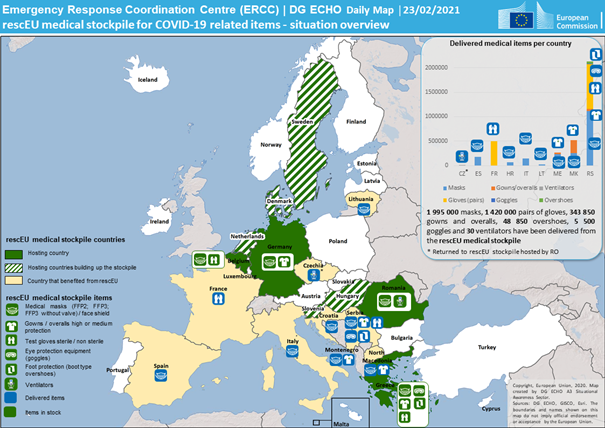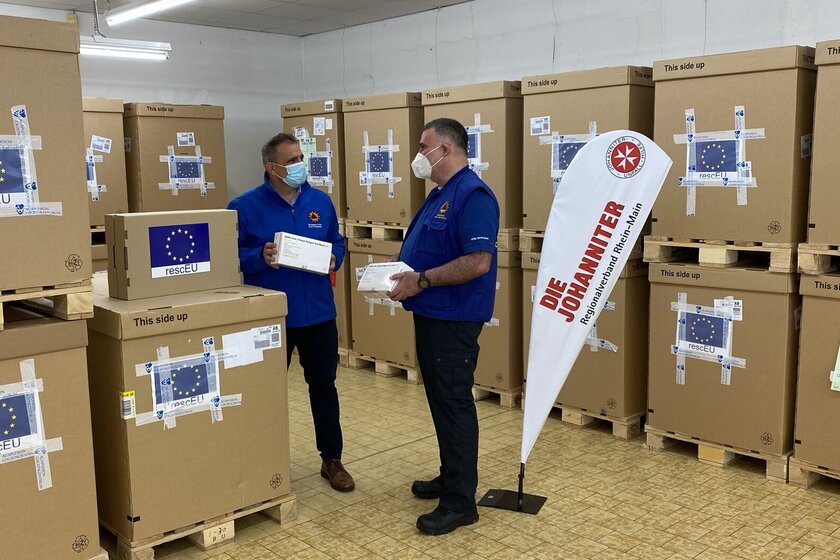On 19th March 2020, the European Commission adopted the “Implementing Decision (EU) 2020/414 amending the implementing Decision (EU) 2019/570 regarding rescEU medical stockpile capacities”, which created the possibility to upgrade the existing rescEU capacities under the European Union Civil Protection Mechanism. The amendment was made in light of the experience gained from the “serious cross-border health threats with human-to-human transmissions, such as Ebola, Severe Acute Respiratory Syndrome (SARS) and Middle East Respiratory Syndrome (MERS)” and the emerging impact of “the novel coronavirus 2019-nCoV and the COVID-19 disease”.
In 2021, the Netherlands, Belgium, Slovenia and again Germany have been commissioned to create medical stockpiles.
The German contribution is operationally run by a consortium led by Johanniter-Unfall-Hilfe, also including the German Red Cross. The Arbeiter-Samariter-Bund, the Malteser-Hilfsdienst, the Deutsche Lebens-Rettungs-Gesellschaft, the Federal States of Brandenburg and Lower Saxony as well as the Federal Ministry of Health and the Robert Koch Institute are represented in an advisory group.
The rescEU procedure is usually addressed directly to the Member States and the States participating in the European Union Civil Protection Mechanism (UCPM). It is rather unusual for NGOs to participate in the procedure. Due to the experience of German NGOs in the field of procurement, stockpiling, rotation, and logistics, the two aid organisations Johanniter-Unfall-Hilfe and the German Red Cross were mandated by the Federal Ministry of the Interior, for Construction and for Home Affairs to seek participation in rescEU medical stockpile as the German contribution. These efforts were rewarded in December 2020 with the conclusion of a contract for the German contribution to rescEU medical stockpile.
This European strategic medical reserve medical stockpile, like all other rescEU capacities, is considered a “last resort” of the UCPM and can be called upon in all emergency situations when national capacities are no longer sufficient.
Once the nine rescEU medical stockpiles have been fully set up, approximately 65 million medical masks, 15 million FFP2 and FFP3 masks, 280 million pairs of protective gloves, 20 million medical gowns and aprons, several thousand oxygen and respiratory devices and other medical equipment will be available throughout Europe.
rescEU medical stockpile DE at a glance
The project is commissioned by the European Union for a period of seven years until 31st December 2027. The financial volume amounts to approximately 108 million euros, which is fully financed by EU funds. Under the measure, medical devices and personal protective equipment (PPE), as well as rapid antigen tests for COVID-19, will be procured. The PPE can be divided into EBOLA PPE and PPE for use in the case of COVID-19 or similarly transmissible diseases.
The procured PPE and medical equipment are registered in the CECIS (Common Emergency Communication and Information System) and can then be requested through the Union Civil Protection Mechanism via the established channels.
In this context, the mandate of rescEU medical stockpile DE agreed with the concluded grant agreement is to procure and maintain the corresponding items and to make them available for transport within 12 hours after acceptance of an offer of assistance in the event of an operation.
The German rescEU medical stockpile DE will include approximately 110 million gloves, 24 million Type II(R) medical masks, 2.5 million FFP2/FFP3 masks, 8 million protective gowns and coveralls, 1 million visors and goggles, 600,000 rapid antigen tests against COVID-19 and 1,000 patient monitors as well as protective equipment and clothing for Ebola treatment (rubber boots, surgical clothing, biohazard bags, body bags).
Timeline
The rescEU medical stockpile DE project officially started on 1st January 2021 and will run until 31st December 2027. An extension of the duration for the medical stockpiles being created in Europe is possible if the need requires it. Project management for the construction and set-up of the sites, including staff recruitment and procurement, began in spring 2021.


